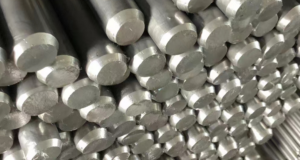The choice of material for machine parts, molds, and dies is paramount in the manufacturing industry. Tool steel, a class of alloys specifically designed for toolmaking, stands out as an excellent material for these applications due to its unique combination of properties. This article delves into the intricacies of tool steel, exploring why is tool steel ideal for machine parts, molds, and dies.

Why is tool steel ideal for machine parts, molds, and dies?
What is Tool Steel?
Tool steel is a category of high-carbon, alloy steels that exhibit exceptional hardness, wear resistance, and toughness. These properties are achieved through the addition of alloying elements such as chromium, molybdenum, vanadium, tungsten, and cobalt. These elements are added in varying percentages to produce tool steels with different characteristics, tailored to specific applications.
Properties of Tool Steel
- Hardness: Tool steel is renowned for its ability to achieve and maintain high levels of hardness. This hardness is crucial for applications that require resistance to abrasion and wear.
- Wear Resistance: The combination of hardness and the presence of alloying elements makes tool steel extremely resistant to wear, even under heavy loads and high temperatures.
- Toughness: Despite its hardness, tool steel also possesses a degree of toughness, allowing it to resist impact and shock without fracturing.
- Heat Resistance: Many tool steel grades are designed to maintain their properties at elevated temperatures, making them suitable for hot working applications.
- Machinability: Tool steel is generally easy to machine, enabling the production of complex shapes and geometries with precision.
Applications of Tool Steel in Machine Parts
Machine parts are subjected to a wide range of stresses and operating conditions. Tool steel’s superior properties make it a natural choice for these applications. Here are some examples:
- Cutting Tools: Tool steel is extensively used in the manufacture of cutting tools such as drills, taps, dies, and punches. Its hardness and wear resistance ensure that these tools maintain their sharpness and accuracy over extended periods of use.
- Bearings and Bushings: The high hardness and wear resistance of tool steel are essential for bearings and bushings, which must withstand continuous friction and abrasion.
- Gears and Camshafts: Tool steel’s toughness and heat resistance make it suitable for gears and camshafts, which operate under heavy loads and may experience sudden impacts.
Applications of Tool Steel in Molds and Dies
Molds and dies are critical components in the manufacturing of plastic, rubber, and metal parts. Tool steel’s unique properties enable it to excel in these applications:
- Injection Molds: Injection molds must withstand the high pressures and temperatures associated with the injection molding process. Tool steel’s heat resistance and wear resistance ensure that molds maintain their dimensional stability and surface finish over multiple cycles.
- Die Casting Dies: Die casting dies are used to produce metal parts by forcing molten metal into a cavity. Tool steel’s hardness and wear resistance allow dies to withstand the abrasion caused by the molten metal.
- Press Tools: Press tools, such as punches and dies, are used to form and cut sheet metal. Tool steel’s toughness and machinability enable the production of precise press tools that can withstand the repetitive forces associated with stamping and forming operations.
Selection of Tool Steel Grades
With so many tool steel grades available, selecting the right one for a specific application is crucial. Factors to consider include the operating conditions (e.g., temperature, load, and speed), the required level of wear resistance, and the material being processed. Common tool steel grades include:
- Water-Hardening Steels: These grades are excellent for applications requiring high hardness and wear resistance, such as cutting tools and punches.
- Oil-Hardening Steels: These grades offer a good balance of hardness, wear resistance, and toughness, making them suitable for a wide range of applications, including dies and molds.
- Air-Hardening Steels: These grades achieve high hardness levels through air cooling, enabling faster heat treatment cycles. They are often used for complex dies and molds.
- High-Speed Steels: These grades are designed for applications involving high cutting speeds and temperatures, such as milling and drilling.
Conclusion
Tool steel’s unique combination of properties makes it the ideal material for a wide range of applications, from precision machine parts to complex molds and dies. By carefully selecting the appropriate grade of tool steel and employing best practices in heat treatment and machining, manufacturers can ensure that their products meet the stringent requirements of today’s manufacturing industry.
Thank you for reading our article and we hope it can help you to have a better understanding of why is tool steel ideal for machine parts, molds, and dies. If you are looking for tool steel suppliers and manufacturers online now, we would advise you to visit Sino Special Metal.
As a leading supplier of tool steel from Shanghai China, Sino Special Metal offers customers high-quality tool steel products at a very competitive price.




